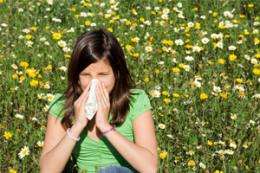Worm therapy for hay fever? More research is needed

Purposely infecting patients with hookworms or whipworms to treat hay fever and other immune-related diseases has been experimented with since the 1970s. A new review by The Cochrane Library concludes that current evidence doesn’t yet support the use of this therapy. However, worm therapy does appear to be safe, the review’s lead author says.
“Allergic diseases affect hundreds of millions of people worldwide, especially in industrialized countries,” says review author Ashley Croft, M.D., a public health physician at the headquarters of the Surgeon General, Whittington Barracks, in Lichfield, UK. “Existing treatments for allergies, which mostly involve pharmacotherapy, are often expensive, dangerous, or ineffective. If worm therapy can be shown to be effective and safe, it will represent an important new clinical option for treatment.”
Croft theorizes that worm therapy might work if having intestinal worms “‘tones up’ the immune system of their human hosts, so that the host stops being over-responsive to common allergens. This helps the worms avoid detection and destruction by the host’s immune system.”
Joel Weinstock, M.D., chief of gastroenterology at Tufts University Medical Center in Boston, is one of the few researchers in the United States investigating the use of worm therapy in immune-related diseases.
“It’s generally appreciated that in the 20th century a whole series of immunological diseases have emerged out of nowhere,” Weinstock explains, including hay fever, asthma, inflammatory bowel diseases, and multiple sclerosis. “Why did these diseases emerge? If you look around the world, these diseases are fairly common in industrialized countries, but in less developed countries, they are relatively rare.”
The cause, Weinstock believes, is the tremendous improvement in hygiene—and that includes lack of exposure to intestinal worms, such as hookworms and whipworms. “Up until the 20th century, everybody had worms,” Weinstock says.
The lack of worm infections in modern societies, Weinstock conjectures, has led to over-reactive immune systems and an increase in immune-related diseases.
Croft’s review examined evidence from two placebo-controlled, double blinded studies that enrolled a total of 130 adults who had either intermittent or persistent allergic rhinitis. One study used hookworm larvae, which enter through the skin and travel to the intestines and the other study used pig whipworm eggs that participants swallowed. Participants who used worm therapy had no reduction in hay fever symptoms or percentage of days when symptoms were minimal. They also had no changes in lung function or quality of life scores.
Croft cautions that these studies are too small to truly evaluate effectiveness. “It did come as a surprise, therefore, that we found that people with allergic rhinitis who took worms were less likely to have to take tablets as rescue medication during the grass pollen season.”
Weinstock also says that the studies to date haven’t been designed very well and says it was surprising researchers found any response at all since the study follow-up times were too short. “To treat an allergy, you probably have to have a treatment strategy that’s at least six months long,” before evaluating effectiveness, he says. The studies ran for only three months and six months, respectively, after initiating worm therapy.
“Our main finding was that worm therapy is safe,” says Croft. “In participants who took worms there were some gastrointestinal side effects, such as abdominal pain and diarrhea, but these were transient and were not so severe as to cause people to drop out of the trials.”
Croft says that there is enough evidence to support continued research in worm therapy. “Clinical trials in worm therapy are not expensive to run and the potential benefits from this new form of therapy are very great,” he says.
More information: Croft A.M., Bager P., Kumar S. Helminth therapy (worms) for allergic rhinitis. Cochrane Database of Systematic Reviews 2012, Issue 4. Art. No.: CD009238. DOI: 10.1002/14651858.CD009238.pub2














